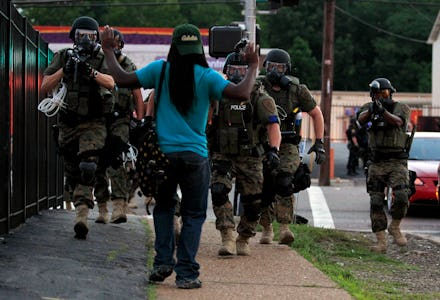One Simple Accessory Could Stop Police Brutality for Good

In the wake of Missouri teenager Michael Brown's tragic death, it seems pretty clear there is one simple tool that could entirely transform how the police interact with the public: body cameras.
As President Barack Obama noted in a public statement on Michael Brown's death, the tragedy should be used as an opportunity for "reflection and understanding" — specifically on how we can prevent such deaths in the future. So, let's get started.
Are body cameras effective? Yes, at least according to the test cases that have taken place so far.
In February 2012, the city of Rialto, Calif.'s 70 police officers participated in a controlled study in which they were obligated to wear a tiny camera that filmed all their interactions with the public. The results were inspiring: In the first year of the cameras' introduction, complaints against Rialto police officers fell by 88%, while use of force by officers fell by almost 60%.
Image Credit: Facebook
"When you put a camera on a police officer, they tend to behave a little better, follow the rules a little better," Rialto Police Chief William A. Farrar told the New York Times. "And if a citizen knows the officer is wearing a camera, chances are the citizen will behave a little better."
According to an Associated Press report published in Seattle Post-Intelligencer, last month's death of a New York City man in a police chokehold has inspired calls for the city to adopt the practice as well.
"We are living in an increasingly technological world, and we should take measures to incorporate video cameras into policing to improve public safety," NYC Public Advocate Letitia James, who has proposed outfitting officers in 15% of the city's precincts with body cameras, told the AP.
Are there ethical concerns? As the BBC notes, the idea of requiring police officers to wear body cameras at all times inevitably brings up privacy concerns: Being constantly filmed could be seen as invasive not only by officers, but by the civilians whom they interact with.
Still, proponents argue that the trade-off is worth it. Last year the American Civil Liberties Union, an organization known for its criticism of surveillance efforts, published a position paper arguing the upsides of body cameras: "Although we generally take a dim view of the proliferation of surveillance cameras in American life, police on-body cameras are different because of their potential to serve as a check against the abuse of power by police officers," the group said.
It's still too early to say what the best way to implement this technology is. But as dashcams, helmet cameras and passers'-by cell phone videos have shown, there is a real need to monitor and document police officers' actions in violent encounters, both to hold them accountable and protect them in a wrongful suit. At a time when trust in America's police is very low — especially among minority groups, as a Reason-Rupe poll points out — a voluntary surveillance system could help both sides: the police and the public.